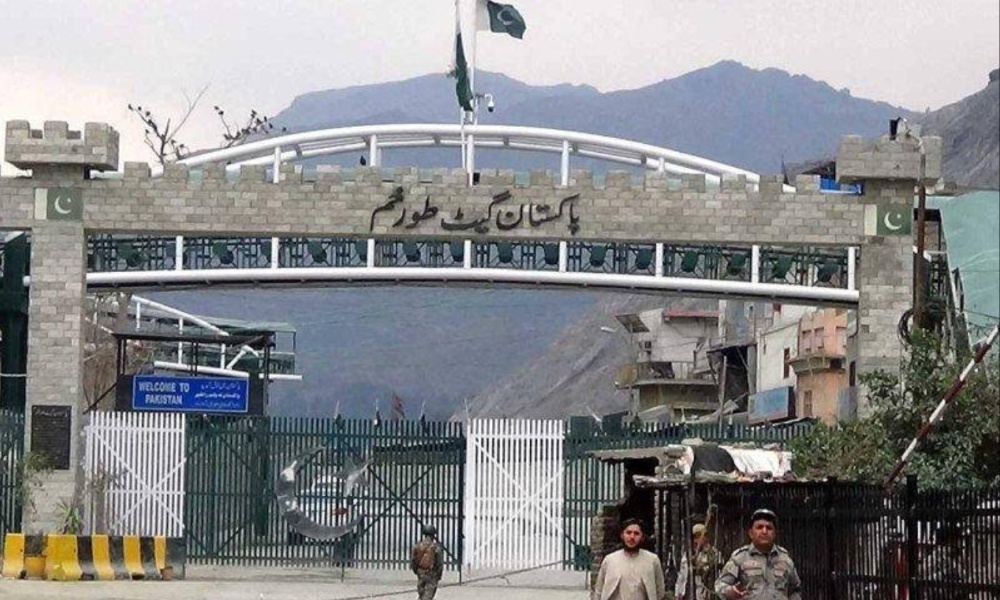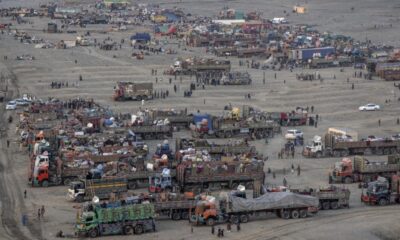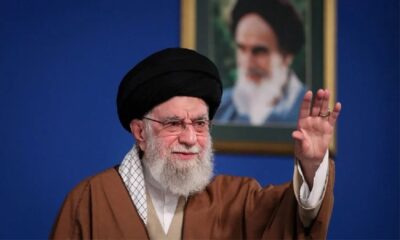Business
Pakistan hands over 3,600 tons of wheat seed to Afghanistan

Pakistan on Monday handed over the first consignment of 3,600 metric tons of wheat seed to Afghanistan as a gesture of goodwill.
Pakistan’s Ambassador to Afghanistan Mansoor Ahmad Khan handed over the consignment, 28 truckloads, to Afghanistan’s Deputy Minister of Agriculture Maulana Fazl Bari Fazli at the Torkham border crossing.
Speaking to the media, Mansoor Ahmad Khan said that the Pakistani government has been cooperating with the Afghan government and its people on humanitarian grounds.
Pakistan has brotherly relations with Afghanistan and extends full cooperation to provide food, medicine, education and medical aid to the Afghan government, he said.
He said that emergency facilities were being provided to patients from Afghanistan while talks were underway between the two governments to permanently resolve the difficulties being faced by Afghan medical patients at border crossings.
He further said that the government of Pakistan has set up three big hospitals in Afghanistan and measures are being taken to up-grade these hospitals so that Afghans get good medical facilities in their own country.
The Pakistani ambassador said that steps have also been taken to expedite and facilitate trade between the two countries adding that due to certain situations in Afghanistan the trade volume has been affected between the two countries.
To promote trade and to solve the problems of the business community, Islamabad and Kabul want to rehabilitate the existing highway and construct a separate route for trade. He said Pakistan would continue its cooperation with Afghanistan to strengthen bilateral relations.
Business
Trump imposes 10% tariff on imports from Afghanistan
The tariffs, he said, were a response. The base tariff of 10 percent on almost all US imports will be imposed by April 5, the additional reciprocal tariffs on countries will kick in on April 9.

President Donald Trump on Wednesday announced a range of tariffs targeting almost all countries that the United States trades with including Afghanistan.
Trump announced the tariffs in an executive order alongside an address in the Rose Garden at the White House on Wednesday.
In the executive order, Trump said while the US trading policy has been built on the principle of reciprocity, taxes and barriers on US products by its trading partners had hurt the US.
The tariffs, he said, were a response. The base tariff of 10 percent on almost all US imports will be imposed by April 5, the additional reciprocal tariffs on countries will kick in on April 9.
During his address, Trump made the argument that the US is charging its trading partners with smaller tariffs compared with the tariffs and non-tariff barriers that the partners impose on the US.
“For decades, our country has been looted, pillaged, raped and plundered by nations near and far, both friend and foe alike,” Trump said.
“If you want your tariff rate to be zero, then you build your product right here in America,” he said.
According to information from officials at the Chamber of Commerce and Investment, currently the total volume of trade between Afghanistan and the United States is between $8 and $10 million annually.
Afghan private sector representatives call on the US to reconsider Afghanistan’s inclusion in the tariffs list.
“It will undoubtedly affect us to some extent. Our trade with the US is small, but important items are exported, such as handicrafts, an industry in which women especially work. Handicrafts such as hats are exported. Antique items that are very important to know our identity are also exported. Dried fruits and sometimes fresh fruits and carpets are also exported,” Khan Jan Alokozai, a member of the Chamber of Commerce and Investment, said.
Abdul Qasim Amarkhel, head of the Dried Fruit Exporters’ Union, says: “The 10% tariff is cruel and illegal. This country is not China or Europe, but Afghanistan. Our dried fruit exports to the US are not that high. It is around $10 million. We ask the US to reconsider this decision. It should also release our frozen funds.”
Afghanistan’s exports to the US are mainly carpets and dried fruits.
Business
Exports to Pakistan grind to a halt over faulty scanner at Torkham
Pakistani authorities closed the border to vehicles coming in from Afghanistan after the scanning machine used to track imports developed technical problems.

A faulty scanner on the Pakistan side of Torkham border left goods trucks stranded in Afghanistan this week, Pakistani media reported.
Pakistani authorities closed the border to vehicles coming in from Afghanistan after the scanning machine used to track imports developed technical problems.
Importers in Pakistan told Dawn that both the Afghan and Pakistani authorities allowed only empty trucks stranded on the Afghan side to cross into Pakistan.
This comes after the border crossing was closed for a month due to disputes and clashes between border forces. The crossing only reopened late March.
According to border officials, this is the second time that the scanner developed problems since the reopening of the crossing. As a result exports from Afghanistan to Pakistan ground to a halt. Exports included coal, soapstone, fresh produce and dried fruit.
Frustrated traders have called for the scanning system to be replaced with a modern version in order to resolve trade challenges at the border.
Traders also voiced their frustration over customs tariffs at the border. They said the customs terminal operator, National Logistic Cell, charges Rs8,000 for every truck that crosses, whether it is loaded or empty.
Business
Gold climbs to record high as tariff worries bolster safe-haven demand

Gold’s record run extended to another all-time high on Tuesday, buoyed by safe-haven demand as investors brace for U.S. President Donald Trump’s planned announcement on reciprocal tariffs.
Spot gold was up 0.3% at $3,131.56 an ounce at 0914 GMT, after hitting a record high of $3,148.88 earlier, Reuters reported.
U.S. gold futures were 0.3% higher at $3,159.10.
“Trump’s tariff comments and his increasingly volatile stance on Russia’s war against Ukraine are proving the perfect chaos for new record gold prices,” surpassing even the COVID pandemic five years ago, said Adrian Ash, head of research at online marketplace BullionVault.
Trump said on Sunday his reciprocal tariffs to be announced on Wednesday would include all countries, rather than a limited number.
Goldman Sachs on Monday raised the probability of a U.S. recession to 35% from 20% and said it expected more rate cuts by the Federal Reserve, as Trump’s tariffs roil the global economy and upend financial markets.
Gold, traditionally seen as a hedge against uncertainty and inflation, has risen more than 15% this year. Non-yielding bullion also tends to do well in a low interest rate environment.
“The market is watching April 2 closely for further economic indicators that could impact Federal Reserve policy decisions. If rate cuts are confirmed, this would provide additional support for gold’s upward trajectory,” said Alexander Zumpfe, a precious metals trader at Heraeus Metals Germany.
Bullion’s rally this year has also been supported by strong demand from central banks, geopolitical instability in the Middle East and Europe, and increased flows into gold-backed exchange-traded funds.
In the last session, gold closed out its strongest quarter since 1986, and climbed over $3,100/oz, marking one of the most significant upswings in the precious metal’s history.
Investors will also monitor U.S. job openings data later on Tuesday and the U.S. non-farm payrolls report on Friday.
Silver steadied at $34.06 an ounce, platinum fell 0.4% to $988.35, and palladium gained 0.3% to $985.86.
-

 World5 days ago
World5 days agoMyanmar quake death toll hits 1,700 as aid scramble intensifies
-

 Latest News4 days ago
Latest News4 days agoSwitzerland re-establishes presence in Kabul with humanitarian office
-

 Latest News4 days ago
Latest News4 days agoPakistan plans to expel 3 million Afghan refugees this year
-

 World4 days ago
World4 days agoSouth Korea, China, Japan seek regional trade amid Trump tariffs
-

 Regional4 days ago
Regional4 days agoIran’s Khamenei warns of ‘strong’ response if US attacks
-

 Latest News3 days ago
Latest News3 days agoAfghanistan’s reconstruction is in the interest of EU: Uzbek president
-

 Latest News3 days ago
Latest News3 days agoUS won’t rest until all Americans detained in Afghanistan brought home: Rubio
-

 Latest News3 days ago
Latest News3 days agoBulgaria brings five people to trial over deaths of 18 Afghan migrants
























